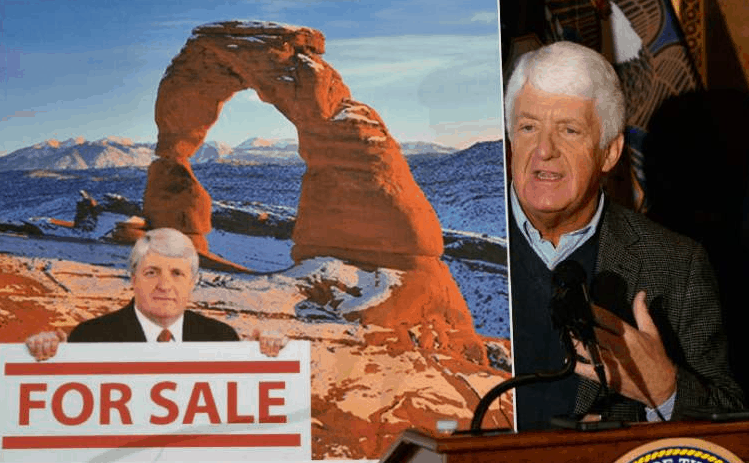The Washington Post has the full story. Unfortunately, the article doesn’t mention the fact that Montana Rep Ryan Zinke – Trump’s Interior Secretary nominee – also voted yes on this provision.
House Republicans, led by Utah’s Rep. Rob Bishop, are preparing to change the way Congress calculates the cost of transferring federal lands to the states and other entities, a move that would make it easier for members of the new Congress to cede federal control of public lands to state officials.
The provision, included as part as a larger rules package the House is slated to vote on this week, has attracted relatively little attention. But it highlights the extent to which some congressional Republicans hope to change the way public land is managed now that the GOP will control both the executive and legislative branch starting Jan. 20.
Under current Congressional Budget Office accounting rules, any transfer of federal land that generates revenue for the U.S. Treasury — whether through energy extraction, logging, grazing or other activities — has a cost. If lawmakers wanted to give land-generating receipts to a given state, local government or tribe, they would have to account for that loss in expected cash flow. If the federal government conveys land where there is no economic activity, such as wilderness, there is no estimated cost associated with it.
But House Natural Resources Committee Chairman Bishop, who backs the idea of providing state and local officials with greater control over federal land, has authored language in the new rules package saying any such transfers “shall not be considered as providing new budget authority, decreasing revenues, increasing mandatory spending or increasing outlays.”
Rep. Raul Grijalva, Ariz., the top Democrat on the Natural Resources Committee, sent a letter Tuesday to fellow Democrats urging them to oppose the rules package on the basis of that proposal.
“The House Republican plan to give away America’s public lands for free is outrageous and absurd,” Grijalva said in a statement. “This proposed rule change would make it easier to implement this plan by allowing the Congress to give away every single piece of property we own, for free, and pretend we have lost nothing of any value. Not only is this fiscally irresponsible, but it is also a flagrant attack on places and resources valued and beloved by the American people.”

Sounds like a great deal but they should at least charge what they paid for acquiring the land originally (i.e. not much). When it gets down to what they can care for then they can keep what’s left (wilderness, roadless, environmental special needs & etc.)
“A forest that pays is a forest that stays”
This is an old stale aphorism.
“A forest that pays is a forest that stays”
Not if that payment is for logs.
There are a lot of policy incentives that could be used to maintain forests that do not require incentives for logging.
Must be true since you said it with such authority! 🙂
More seriously though:
1) what is wrong with stale if it is true? Your attempt at forcing me to stay inside some style or arbitrary P.C. box instead of being only bound by science and civility was a waste of your time.
2) what is wrong with logging when sustainable & consistent with the landscape level goals, laws & best management practices?
3) why are large catastrophic fires acceptable but more enviromentally friendly, small (<120 ac) non-contiguous, clear cuts aren't for shade intolerant species?
4) glad that you believe that "There are a lot of policy incentives that could be used to maintain forests that do not require incentives for logging"
5) please describe 10 "policy incentives that could be used to maintain forests that do not require incentives for logging" that you support.
6) please explain why those policies aren't already in place to the point of improving the health of our federal forests.
The federal government, and the American people, own roughly 640 million acres in the United States. Anyone know how much of that 640 million acres is forested with trees that are merchantable? My guess is around 10 to 20%.
Certainly, we need a real definition of “merchantable”, as well. Steeper forested slopes don’t really have merchantable trees if the small thinned trees have to be flown out. There’s also those acres that have been excluded from logging, for valid and important reasons.
That being said, thinning in the Sierra Nevada isn’t anywhere close to the “pace and scale” needed to have the desired results. Only a few extreme groups are against the current style of thinning projects, yet the political barriers will continue to exist.
In the west, the feds initially acquired the land from other countries, not from the states or private parties. So yes, taking something of mine and giving it to Utah or a corporation is a good deal for them.
Jon
Requiring the original purchase price (as I clearly specified) is not giving anything away especially when we consider the depreciated state of the asset.
And who is talking about transferring to corporations and especially giving to them? Mutually agreed upon, like kind exchanges with corporations is how it is generally done and there is no mention of anything different.
As to it being your land, if you (or anyone or any entity) received it as a trust to protect, and can’t do the job properly then it is time for courts/gov’t to find someone who can.
*sigh* If only we could tax the rhetoric coming from both sides of the aisle *smirk*
Thank you for the comic relief. 🙂